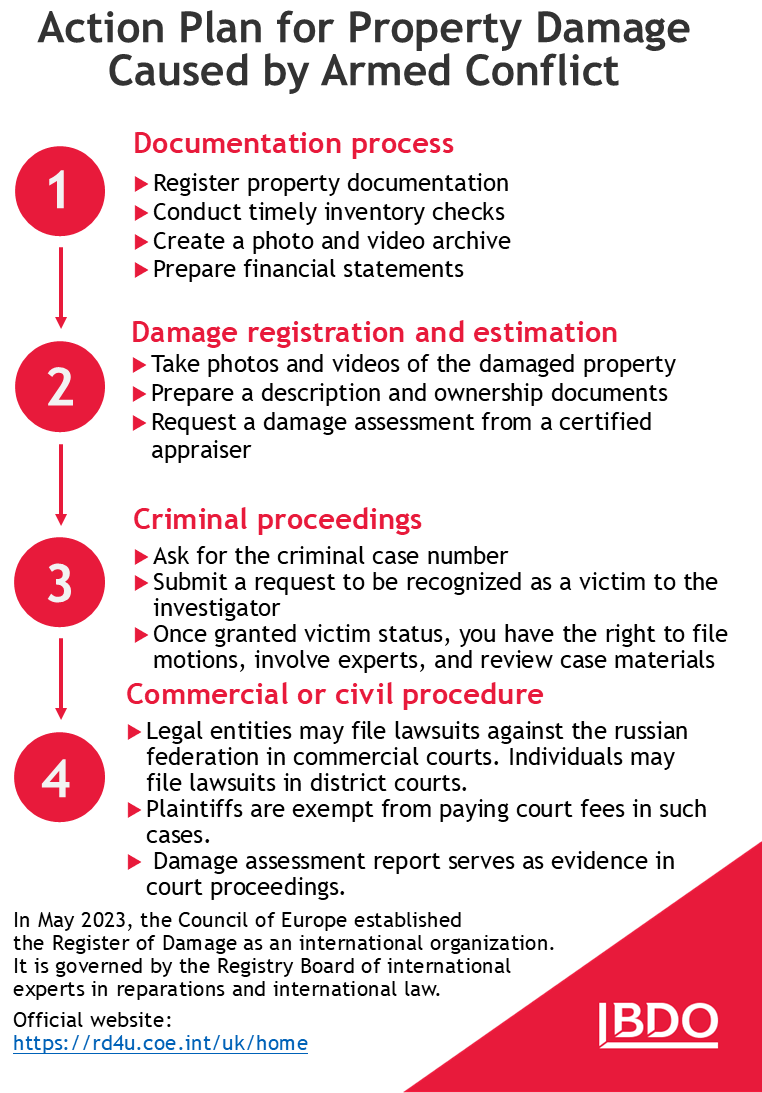For four years now, Ukrainian businesses have been facing the risks of property damage and obstacles to their business operations. It is important to know in advance how to act in such cases to protect your rights and receive compensation.
Below is an algorithm of actions that will help you navigate the legal mechanisms for recording and compensating losses.
Within the framework of national law, there are currently two legal procedures available that are advisable to use:
- In criminal proceedings, to recognise the procedural status of the victim,
- Within the framework of commercial proceedings (for legal entities) and civil proceedings (for individuals), to obtain a court decision on the recovery of damages from the aggressor-country.
International legal mechanisms, such as the Register of Damage, are currently not fully operational or are too expensive (as they involve international arbitration) for ordinary businesses in terms of the amount of costs. The use of the above national mechanisms does not preclude the use of international mechanisms, such as reparations through the Register of Damage, when the time comes. The purpose of using national mechanisms is to record the fact of losses and their amounts in the legal field.
Below, we will consider in a simplified form the procedure for applying national mechanisms. Here is an example. A production facility was destroyed by a missile strike. No one was killed. In this case, the investigator enters information about the crime under Part 1 of Art. 438 of the Criminal Code of Ukraine “Violation of the laws and customs of war” into the USRPTI (Unified State Register of Pre-trial Investigations). Jurisdiction over this category of offences is determined by the SSU.
1. Criminal proceedings
The company that suffered damage needs to find out the number of the criminal proceedings and submit an application for recognition as a victim to the SSU investigator. After that, the investigator must issue a decision on recognition as a victim in this criminal proceeding within 3 days. From the date of acquisition of the procedural status of a victim, a person has a wide range of rights provided for by the CPC (Criminal Procedure Code of Ukraine), in particular, to file a petition for certain investigative actions, such as interrogation of witnesses, involvement of specialists, reviewing the materials, etc.
Separately, it is advisable for the company to assess and document the losses on its part. To record the damage, it is necessary, in particular, to have:
- Photos/videos from the scene of the incident
- Description of the damaged property: detailed description, documents of ownership
- Assessment of the damage by a certified appraiser.
There is now an approved Methodology for determining the damage and amount of losses incurred by enterprises, institutions and organisations of all forms of ownership as a result of the destruction and damage to their property in connection with the armed aggression of the russian federation, as well as lost profits from the inability or obstacles to conduct business.
Damage and losses consist of actual losses and lost profits. The amount of actual losses resulting from damage, loss or destruction of property is determined as the difference between the value of such property before and after the damage was caused. The amount of lost profits is determined in respect of property, whose owner (balance sheet holder, user) suffered real losses that resulted in loss of profits. Lost profit means the amount of profit accumulated over a certain period of time that the owner (balance sheet holder, user) of the damaged, lost and/or destroyed property could have received if the property had not been damaged, destroyed or lost as a result of armed aggression. If the company demonstrated loss-making activities in 2020 and 2021, the assessment of lost profits is not carried out for it.
Initial data for assessing actual damages are documents that specify the characteristics of the property to be assessed, in particular those contained in state registers or registers of local governments; and documents drawn up by the relevant commissions during the inspection of the object of damage, based on the judgements (testimony) of the members of the commissions, in particular: Title documents for the damaged property (Certificate of ownership, Purchase and Sale Agreement, Extract from the State Register of Real Property Rights, Technical Passport, State Land Act, Lease Agreement):
- expert opinion on the inspection of damaged and/or destroyed objects after the damage
- photographic documentation of the facts of damage or destruction of the property being appraised (before, if any, and after the damage)
- project documentation confirming the cost of restoring the property (consolidated estimate with local estimates), if available
- a certificate confirming the last date of major repairs before the damage or destruction and the amount of costs for these repairs
- other documents.
Information sources in the course of damage assessment:
- results of the inspection of the object of valuation, including with the use of technical means and information sources (photos, video materials, remote sensing data and their derivative products, social media analytics, available public information, etc.)
- market data used in the assessment of damages: information on transactions of sale and purchase of property similar to the object of assessment, market prices for similar property, etc.
- information from other acts (reports, expert opinions) drawn up on the basis of the results of the damage assessment
- other information sources.
The damage assessment report is valid until the date of compensation for damages (inclusive).
After receiving the assessment report, submit it together with a request for attachment to the SSU investigator conducting the pre-trial investigation in the criminal proceedings.
The peculiarity of criminal proceedings is that only an individual can be a suspect in them, for example, the relevant serviceman of the russian armed forces who ordered the missile strike against your company.However, pursuant to the provisions of Article 1174 of the Civil Code, damage caused to an individual or legal entity by unlawful decisions, actions or omissions of an official or employee of a public authority in the exercise of his or her powers shall be compensated by the state regardless of the fault of that person. Therefore, the civilian defendant in the criminal proceedings should be the “russian federation” and not a specific russian serviceman.
It is important to note that filing a civil action in criminal proceedings is a right, not an obligation, of the victim. A claim may also be filed by the victim outside the criminal proceedings, depending on the specific circumstances. For example, a civil action in a criminal proceeding may be filed after a suspicion has been served, i.e. if there is no person with the procedural status of a “suspect” yet, filing a claim would be premature. In this case, it is more efficient to file a separate lawsuit in commercial proceedings (for legal entities or individual entrepreneurs) or civil proceedings (for individuals), depending on the subject matter.
Property insurance should be mentioned separately. If the property has been insured against war risks, the victim should check the amount of indemnity, whether it covers the amount of damage, the existence of a deductible, and the list of documents required by the insurance company to establish the insured event. Any actual insurance indemnity will reduce the amount of the victim’s actual damages.
2. Commercial proceedings
If the victim is a legal entity, it may file a lawsuit in a commercial court against the russian federation, which does not have judicial immunity in cases of compensation for damage caused by its armed aggression. This position has been repeatedly expressed by the Supreme Court (Resolution as of 14.04.2022 in case No. 308/9708/19, 18.05.2022 in case No. 760/17232/20-ц). Ukrainian courts are now making appropriate decisions in favour of the victims.
If real estate is damaged, the claim must be filed with the commercial court at the location of such property.
It is important to note that plaintiffs in such cases are exempt from paying court fees pursuant to par. 22, part 1, Article 5 of the Law on Court Fees. The damage assessment report may be used in such litigation as evidence of the amount of damage. In such cases, it is also advisable to order a forensic examination of the amount of damages.
A national court decision in favour of the plaintiff establishes the fact of the damage and its amount, and can be further used in international recovery mechanisms, in particular through the frozen assets of the aggressor.
In May 2023, the Council of Europe established the Register of Damage as an international organisation. It is governed by the Registry Board of international experts in reparations and international law. Official website: https://rd4u.coe.int/uk/home.
Given all the current realities, we recommend that businesses ensure proper preparation of documents, in particular:
- Execute documents confirming ownership of buildings, equipment, inventory, land plots, etc.
- Conduct a regular inventory of assets and resources.
- Create a photo and video archive of the current state of the property (before possible damage).
- Prepare the financial statements that can be used to assess damages.

If necessary, you can contact BDO in Ukraine for advice on legal issues, as well as business valuation and war damage services.
We will guide you through this process with confidence and with reliable legal support.



